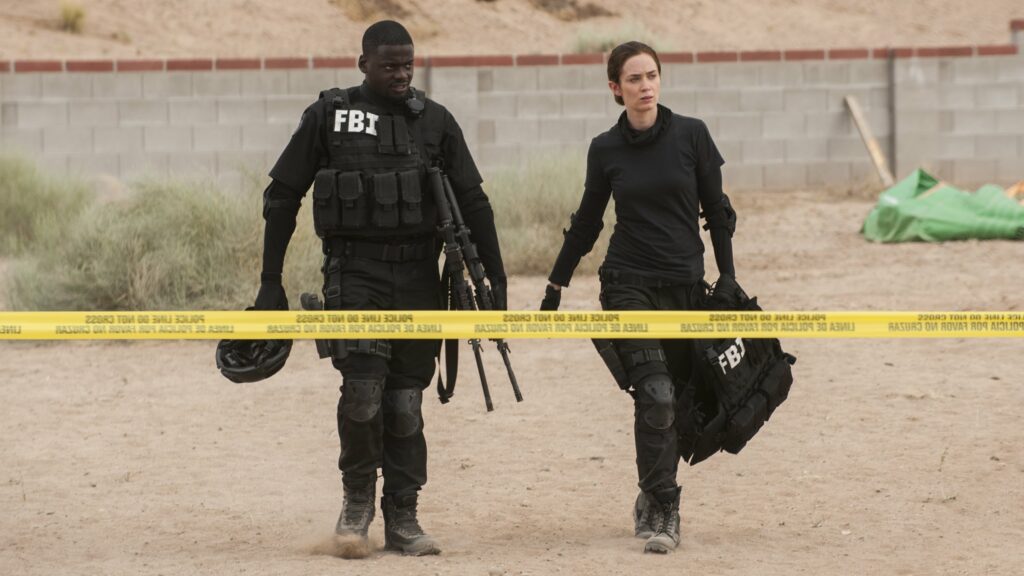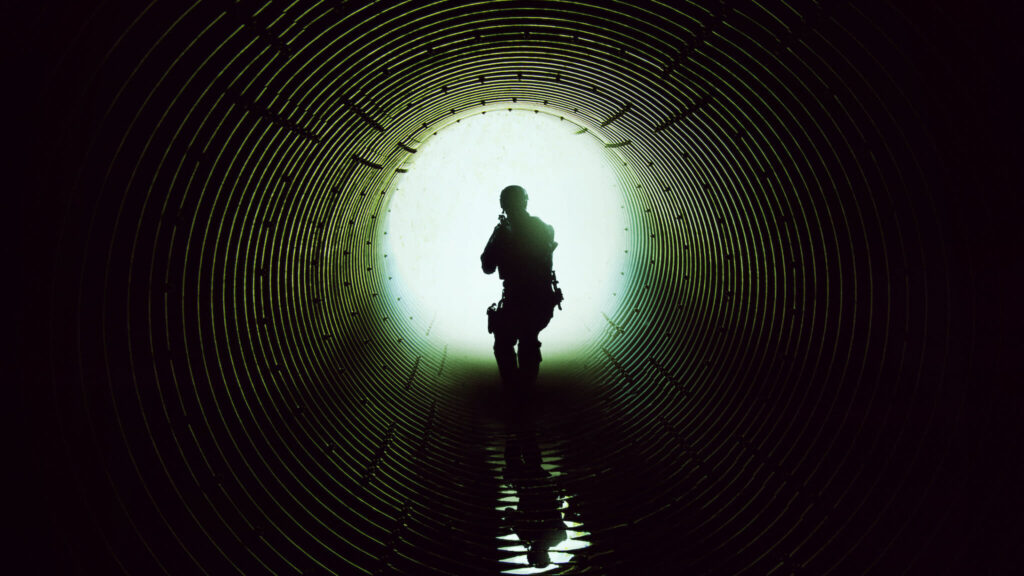"This is the land of wolves now"
I’ve seen Denis Villeneuve compared to Christopher Nolan on multiple occasions, and I think there’s some truth to the comparison. Both are craft-first, action-heavy filmmakers who use their budgets well and overwhelm you with cinematic sweep. Both use narratives with the grace of a cudgel and, too often, treat emotion and interiority as that annoying stuff that I guess you probably need to make a story work, at least they read that in a book one time.
The difference is that Nolan is constantly trying to show you the niftiest clock he made, with all the glorious gears and components sliding together so cleanly that you didn’t even notice that one little bit over there setting up a perfect twist or breathtaking climax as he stands in the corner and smiles to himself at your joy. Early/mid-career Villeneuve, meanwhile, beats his fists bloody against the table, shouting until he’s hoarse, as his contraption does its trick so that you’re kind of distraught even when you’re impressed, and he seems to think his display of the dark underbelly of man made it all the more profound rather than tedious. I don’t know; this analogy is slipping away from me.
The point that I’m trying to get it at here is that Sicario is really terrific as a thriller qua thriller, simply an outstanding piece of cinema. It’s also just too obvious in its messaging and cynical in its spirit for me to ever get really invested in it. I keep watching Villeneuve’s movies thinking that he’s just on the cusp of making his truly great film, the one where the emotions and the narrative are in perfect sync. The closest he’s come for me through his first seven films is Incendies, which has an emotional and storytelling sprawl to it with a compelling interplay between violence being an alien force of global catastrophe and it being a personal, family-wrecking specter. Every other one of his films has miscalibrated one or more of its central features in some crippling fashion, and Sicario continues that trend.

I guess what bugs me is that Villeneuve tells us everything we need to know about the story and its characters and its morals in the first thirty minutes, then later treats what he’s already told us as some big revelation as he whacks the themes with a crowbar. Here are a few things Sicario has shown us by the end of the first shootout on the street, just over 30 minutes in: We know that FBI Agent Kate Macer (Emily Blunt) is a “good cop” who’s going to lose herself in the violence and depravity of this War on Drugs that she has been recruited to help out with. (By the way, she’s written like she’s a rookie cop on her first day; is it really believable a seasoned FBI agent would be this naive or aghast at special operations teams functioning outside standard ethical protocol?) We also know that Alejandro Gillick (Benicio Del Toro) and Matt Graver (Josh Brolin) are monstrous, torturing, kill-first-talk-later rogues who have already lost said humanity and will try to take Macer down to their level. And we know this cycle of violence inherent in the “War on Drugs” is cruel and family-ruining and poisons everything it touches.
And then 75 minutes later, would you look at that, we have had all of those points demonstrated for us in explicit detail. The only questions we couldn’t have answered at the end of the first act is just how far Villeneuve would push this plot, and given that the most brutal scene of the film might be the opener, I’d say he doesn’t punish his characters nearly as much as he could have. Sicario certainly punishes the audience, though — this tops even Prisoners in its miserabilist, nihilist tone, cycles of violence spiraling into darker and darker abysses.

The one real surprise of the ending comes from a shift in perspective. Much of the final act centers around Del Toro’s Alejandro as much or more than Agent Macer. The first half of the film had suggested that Brolin’s casually cruel Graver would be the main antagonistic force and Alejandro would just be some counterweight, but that flips strongly in the second half, such that Alejandro is the main moral casualty of the film’s cycle of violence. It’s what I liked most about the film’s ending from a character writing perspective.
From a cinematic perspective and a thrills perspective? Holy shit, Villeneuve is on his game. The opener is a gut-wrenching corker of a home drug raid, ending with a cruel punchline. Scene after scene is shot with grit and tactility, and Villeneuve has just the right instincts for keeping us in the space of action while still making us feel overwhelmed with the chaos and danger, whether it’s a traffic jam, a bar hookup gone wrong, or an infiltration of a base.
As always, Villeneuve gets some strong performances out of the cast. Blunt is eminently watchable and empathetic (not to mention outrageously beautiful) as Agent Macer, though she doesn’t take the two-dimensional character to any special places. Brolin, too, doesn’t really add anything too surprising to the character of Graver as he’s written on the page, though he does deliver it with a heck of a lot of smarm. The real standout among the key players is Del Toro, whose mercenary has cracks of sadness and regret to temper Alejandro’s quiet badassery.

But the real star of Sicario is Roger Deakins, who delivers a tour de force of cinematography. Sicario has some of the best photography in any film of the 2010s. Almost every scene you can pause and stare at the lighting and coloring and gorgeous geometry of a shot for the sheer aesthetics, and in every case it offers some sort of visual storytelling cue, too: the water-stained yellow interiors of the CIA office where covert torture and moral rot is happening; the harsh blue lighting of a nightclub where Agent Macer is feeling disoriented and displaced; the perilous stormy skies of a drug boss assassination attempt in turmoil. If there is a case that Sicario is an outright masterpiece, it lies in Deakins’ cinematography complementing Villeneuve’s thriller craftsmanship.
If only the film’s brains and heart could match its adrenaline and beauty, we’d be talking about an all-timer. It’s still pretty squarely a good film, but it only ever approaches greatness in a handful of moments, and the overall package is too dour and blunt to love. With every movie I’ve watched in my binge of Villeneuve’s filmography through Sicario, I keep telling myself that he’s close to making a great film. I’m crossing my fingers that he gets there with the sci-fi turn his career took after Sicario.
- Review Series: Denis Villeneuve
Is It Good?
Good (5/8)
Awards, Honors, & Rankings
Dan is the founder and head critic of The Goods. Follow Dan on Letterboxd. Join the Discord for updates and discussion.

